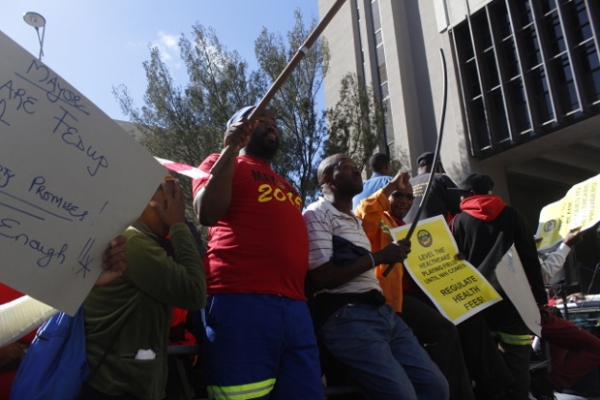

SAMWU protest in Cape Town, 6 May 2015. Photo by Masixole Feni.
7 May 2015
Dr Virginia de Azevedo, the City Health Manager in Khayelitsha, has become a target of SAMWU strike action which affects ten City of Cape Town run clinics in Khayelitsha.
It has been said that staff grievances have led to a call to remove Dr de Azevedo and two other managers, who make up the City’s senior management team in Khayelitsha clinics. The substance of the claims is yet to be investigated by an independent party but protest has been embarked upon.
Dr Azevedo has had a 30-year career in the City of Cape Town, ten of which were spent leading the health team in Khayelitsha.
At this point it is only to fair to reflect on Dr de Azevedo’s contribution to the provision of accessible healthcare and the quality of health services for residents of Khayelitsha. Since she started working in Khayelitsha in 2005, the population of Khayelitsha has steadily grown, to an estimated half a million people, the majority of whom have come from the Eastern Cape seeking education, job opportunities and health care.
Under her leadership, health outcomes have improved significantly. Most notably, mortality of infants and children under five years of age has dropped from 2001 to 2010 by more than 50% and 40% respectively, a rate substantially higher than other sub-districts in the Cape Metro.
Similarly, Khayelitsha achieved the highest reduction in those who die each year from infectious diseases (mostly HIV, TB and diarrhoeal diseases) compared to elsewhere in the city where there was either an increase, stabilization or nominal reduction in such deaths. Her eagerness to work with partners brought extra resources to improve health infrastructure, increase healthcare worker posts and extend the package of services provided by the clinics.
During her tenure as sub-district manager, a number of City clinics have been upgraded and new clinics were built. Access to health services for men was improved through male clinics and a Substance Abuse Matrix Unit was opened, which provides an extremely important service for community members struggling with substance dependency.
She can also be credited with working tirelessly to ensure that the South African law which allows a woman to choose to terminate an unwanted pregnancy was not only useless words in a law book but a service available for those who need it, saving many women from having to seek dangerous back street abortions.
She has encouraged innovation, to ensure more people get the care and treatment they need close to their homes. She continues to push and support partner organizations to think “out of the box” and do more. This has meant that Khayelitsha was the first place to start treatment for drug resistant TB patients at local clinics, the first place to mentor nurses to comprehensively treat and manage HIV and remains the only district in the Cape Metro where every clinic provides antiretrovirals. This has not only led to fewer deaths and improved health for those who live in Khayelitsha but has also provided very important lessons which have been implemented and improve the lives of those living in other places in the country and beyond.
Senior management always walks the thin and difficult line between ensuring the best quality healthcare is provided to community members and meeting healthcare workers expectations with regards their desired work conditions. It may be time to take a step back and ask: for how long will Khayelitsha residents continue to have access to good quality public sector healthcare services if hard and sometimes unpopular decisions are not made to tackle poor performance which places lives at risk?
The author is the Médecins Sans Frontières (Doctors Without Borders) Project Co-ordinator, Khayelitsha. Views expressed are not necessarily those of GroundUp.